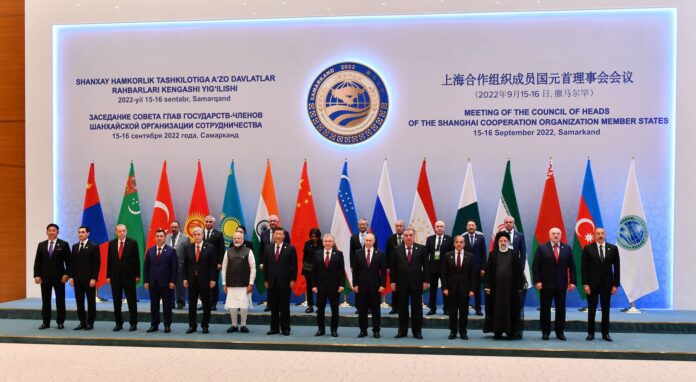In its 21 years since inception, the alliance seeks to promote regional peace and security cooperation within its member states and primarily reject world hegemony by the Western superpowers. It has become increasingly clear to developing countries, including the SCO member states, that reliance on the West for equality and fair play in trade can no more be guaranteed and an alternate trading/security bloc is the need of the hour.
The annual meeting of the Council of the Heads of State of the Shanghai Cooperation Organization (SCO) was recently held in the Uzbek city of Samarkand, from Sept 15-16, hosted by the current SCO Chair, the President of Uzbekistan. The bloc of countries includes Pakistan, Iran, Turkey, India, and other Central Asian states and is led by the Russian and Chinese Presidents. As an indication of its importance and legitimacy, other countries such as Belarus, Bahrain, UAE, Kuwait, Maldives, and Myanmar have lined up and applied for membership, poised to further expand the alliance, and enhance its sphere of influence. In the meeting, key topics such as the war in Ukraine and China’s increasing tension with the West were discussed.
In a world of multipolar changes and fluid dynamics, there has been a consensus amongst Asian countries to forge an alternative to the Western-dominated world trade. Led by Russia and China, the bloc aims to rely more on its region for trade and security, slowly shedding its dependency on the West. In its 21 years since inception, the alliance seeks to promote regional peace and security cooperation within its member states and primarily reject world hegemony by the Western superpowers. One may understand that because of the unilateral steps taken by the West towards countries it deems unfriendly, such as the imposition of hard-hitting sanctions, which are sometimes unjustified, it was a matter of time for blocs such as the SCO to be formed.
Dominated by Russia and China, it has become increasingly clear to developing countries, including the SCO member states, that reliance on the West for equality and fair play in trade can no more be guaranteed and an alternate trading/security bloc is the need of the hour. There has also been a growing realization by the SCO that if world trade is conducted in US Dollars, they are vulnerable to crippling effects on their economies, by way of abrupt sanctions and freezing of funds by the US, as has been the case of Afghanistan. One of the main points discussed in this meeting has been the suggestion by member states to conduct trade within their bloc in their currencies and ditch the US dollar. Such a step would undoubtedly worry the Americans as it would dent their influence over their nemesis i.e., Russia and China.
Another interesting aspect of the SCO is its membership of India. India is part of the QUAD Alliance, which also includes the US, Australia, and the UK, and is seen as an alliance formed to curtail China’s influence in the region. However, despite its association with QUAD, India has desisted from publicly denouncing Russia for its invasion of Ukraine, much to the annoyance of the West. It is also importing a substantial portion of its oil inventory from Russia, at discounted rates and payable in rupees. It is also important to remember that Russia has been India’s largest arms supplier to the country. The Modi government has also managed to defuse tensions with its neighbor China, over border issues. Suffice to say that for the Indian government, its membership both in QUAD and the SCO is a win-win situation for the country and India, by virtue of being the world’s 5th largest economy in the world, it will not take any threat from the West seriously.
For China, the SCO offers a platform and a unique opportunity for it to take the initiative and along with its member states, bring in new world order, devoid of US influence and hegemony. On the other hand, the US and its allies view the SCO as a group of countries with authoritarian regimes and a dismal of human rights. Tensions are high and relations between the US and China are at a historical low. It is a decisive moment in world politics and as we all know, the beginning of a new Cold War.




